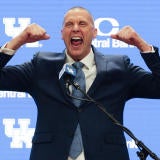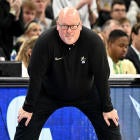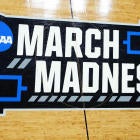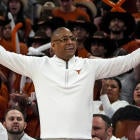SAN ANTONIO, Texas -- Two years ago, Texas swimmer Joseph Schooling was paid $753,000 by his native Singapore for winning a gold medal at the Olympics. One year later, he was not only eligible to compete at the NCAA Swimming Championships, he also won six medals.
Somehow, an NCAA athlete getting paid three quarters of a million dollars didn't run the amateur model into a ditch.
Just don't let those dollars get anywhere near football or basketball players, though.
NCAA president Mark Emmert held his annual press conference Thursday at the Final Four. He updated the media on the Commission on College Basketball led by Condoleezza Rice that is supposed to stamp out corruption in college basketball.
He shouldn't have to be reminded it would be easier to stamp out the heat in Phoenix.
The swimming illustration is just one example of the hypocrisy that is the NCAA's amateurism policy.
Those athletes can be paid by their sanctioning bodies and home countries because, well, swimming doesn't matter. No one who cares about the amateur model cares about swimming. The NCAA allows elite swimmers to collect up to $1,750 a month as a stipend.
Ah, but buy a 14-year-old budding point guard on the AAU circuit a lunch, and we've got a major problem.
According to USA Swimming, professionals can be paid $3,000 a month. That's the difference that led five-time Olympic gold medalist and 14-time world champion Katie Ledecky to leave Stanford's pool this week and turn pro.
There is no doubt college athletics is a better place with Ledecky swimming. But it's not Ledecky that rejected college athletics; it's the NCAA that has rejected her.
"I think you described nicely one of the challenges that was put in front of the [Rice] Commission itself," Emmert told me.
Over decades of neglect, the NCAA created the culture that allows a seedy basketball culture to operate underground at the same time it pushes Ledecky away. Ledecky will still go to school. She can even train with Stanford. But God forbid a "pro" gets in the pool with the NCAA's pristine athletes.
FBI, NCAA, Bob Mueller … someone please save us.
"The most fundamental principle here … is whether or not we want to have college sports as it exists today," Emmert said. "Whether we want to move toward a model where these are employees that are compensated whether directly or indirectly for their performances."
Wait, isn't that what we just described with Schooling? We're way past the point of elite athletes having their sport as a job. It's not even a discussion. If you're around the Final Four, the College Football Playoff or a random Sun Belt volleyball match, players are in college to be athletes first.
A degree -- an education -- is value added.
"College athletics should be about education," Big 12 commissioner Bob Bowlsby said, "but this a very unique model. There is nothing like it any place in the world."
Bowlsby's right. No other sports body in the world adheres to such strict amateurism standards. For better or worse, the NCAA says its athletes can't be paid -- then pays them in the form of cost of attendance stipends, bowl gifts and free insurance premiums.
But if Ledecky wants to do a Delta Airlines commercial, by God, she can't be an NCAA swimmer.
"Universities and colleges … don't want to have student-athletes become employees of a university," Emmert said. "They don't want them to be playing for compensation."
Again, that's exactly what's happening at least at the highest level. And that's exactly where the NCAA is most vulnerable -- in the courtroom instead of on the court -- thanks to an aggressive FBI.
The college experience at one SEC school, a coach once told me, is the possibility of collecting more than $90,000 in federally-funded Pell Grants.
Sure, those Pell Grants are available to all students, but let's also remember this: That player probably wouldn't be at that SEC school unless he could play football and collect that Pell money.
So let's get back to the starting line. With the commission ready to reform college basketball, keep these things in mind …
Short of adopting the Olympic model (see above) and/or allowing players rights to their name, image and likeness, what improvement is there?
In other words, what sort of reform keeps Adidas from allegedly paying $100,000 to the family of Louisville recruit Brian Bowen?
Answer: There isn't enough reform unless that sort of thing becomes legal. Considering the court battles the NCAA is enduring at the moment, it might.
A California district judge on Tuesday called the NCAA back into court this week to defend its limits on compensation to athletes.
At least two conferences (Pac-12, Big East) have offered comprehensive reforms themselves. They are high-minded, fair and just might work.
The Big East has gone as far as to suggest the NCAA granting subpoena power. Third-party investigations have been mentioned by Emmert himself.
"I'm hearing more discussion about that than ever," said Bowlsby, a critic of the NCAA enforcement.
The Big East wants investigations on the level of United States Anti-Doping Agency. You know, the group that helped catch Lance Armstrong.
This is not for doping; it's for all cheating. Hire the toughest, best-trained investigators out there. It can be argued with some certainly the NCAA doesn't have the best and brightest investigating its schools.
"It's clear what they have now may not be enough to keep up with 351 Division I schools," Big East commissioner Val Ackerman said.
The association operates at its quickest -- and perhaps best -- when the threat of legal action is bearing down.
It used to be against the rules to offer bagels with cream cheese. Really. That changed because perhaps some nutritionist/economist had an epiphany. It used to be a violation to pay players. Then cost of attendance came along.
The NCAA is largely responsible for creating the market that led to the Bowen inducement and the FBI investigation overall. Shoe wizard Sonny Vaccaro said it best: If you want to stop the corruption, stop taking the shoe companies' money.
That ain't happening. UCLA, for one, got paid $280 million for Under Armour to provide its apparel. Try slicing that number out of the budget.
So, it seems reform might as well be a hamster on a wheel going nowhere … unless the NCAA realizes that letting Ledecky do a Delta commercial and continue swimming under its banner isn't the worst thing in the world.
"Our view is we're going to have college students who are athletes, and we're going to have the structure for them," said Eric Kaler, University of Minnesota president and chair of the NCAA Division I Board of Directors. "Once you start sliding down there, it's a slippery slope."
How slippery depends these days on how much your compensation is legitimized.





















